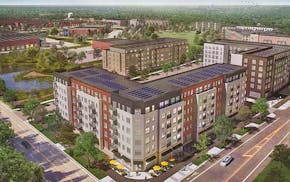For a city so concerned about economic growth that it's willing to pick a fight with federal officials over zoning rules, St. Anthony officials come up embarrassingly short on answers when questioned about the development potential of the unused office-building basement at the heart of a high-profile dispute over land use and the nation's relatively new laws protecting religious freedom.
The 11,600-square-foot space in the spotlight is in the three-story St. Anthony Business Center along Old Hwy. 8 in the north-metro suburb. The former Medtronic headquarters is now owned by the local Abu Huraira Islamic Center, which leases the building's aboveground space to businesses and plans to keep doing so.
But the center's leaders have long wanted to turn the dim, unused basement into a centralized place for worship and for community events for far-flung metro members. After looking for the right spot for years, the group petitioned St. Anthony in 2012 for a permit to meet in the building's basement. But the city, which previously had allowed "assembly, meeting lodge, or convention halls'' in light industrial zoning, suddenly changed the rules after controversy flared over the Muslim group's petition. Officials denied the permit, saying they wanted to preserve the city's limited industrial space for business.
This week, after a lengthy investigation, U.S. Attorney Andrew Luger and the U.S. Department of Justice filed a civil-rights lawsuit against the city, alleging a violation of the 2000 Religious Land Use and Institutionalized Persons Act — one of a number of federal laws aimed at preventing government from putting an undue burden on freedom of religion. RLUIPA protects religious institutions from discrimination in zoning and land use.
Rather than settle and accede to the lawsuit's modest request to allow the group to use the space, St. Anthony's City Council decided earlier this month to double down on its dubious reasoning for denying the permit. In a closed meeting, the council unwisely voted to fight the lawsuit, pitting the inner-ring suburb of 8,200 against powerful interests in what is likely to be a losing and damaging battle for the city.
Even as city officials continued to try to rationalize their position — that this is all about job generation — they could not name any businesses that have expressed interest in the basement space. Nor did they cite any industries for which the space might be suitable or how many jobs might be generated there.
It's also unclear if the city considered the substantial indirect economic benefits that might accrue to nearby businesses from thousands of potential new customers that would be driving to the center. City Attorney Jay Lindgren could not provide this information during an interview this week, but did say the city expanded options for religious assembly in other zoning areas. St. Anthony Mayor Jerry Faust could not provide specific answers, either.
If this dispute was really about economic development, those answers should have been forthcoming. It's easy to see why outside experts scoffed at Lindgren's assurances that this is simply about the city's exercising its right to protect industrial space. "The city's stated reason is nonsense; no one is going to put an industrial operation in the basement of an office building. They would rather have the basement sit empty and unused than let Muslims in,'' said Douglas Laycock, a University of Virginia School of Law professor and leading authority on religious legal issues.
Luger is to be commended for making this issue a priority during his first months in office. After the U.S. Supreme Court ruling in favor of Hobby Lobby's evangelical Christian owners, who were opposed to providing certain forms of contraception to employees, the Minnesota lawsuit is a timely reminder that the nation's legal protections for religious freedom apply as well to less familiar faiths. Pursuing justice on behalf of Abu Huraira's many Somali-American leaders will also help strengthen that community's commitment to its new American home.
The detailed complaint filed by Luger's office makes a strong case for why St. Anthony's zoning change violated RLUIPA. That a union hall with banquet facilities has been permitted to operate in the city's light-industrial zone while Abu Huraira's "assembly" was not permitted is a serious red flag. That another church was allowed in 2008 to assemble in an area zoned for commercial use is also troubling.
Laycock's unequivocal perspective should also send a strong message to the city about how a federal judge might look upon the alleged civil-rights violation. "Cases like this are why RLUIPA was enacted,'' Laycock said.
City leaders should realize that a protracted legal battle is not in St. Anthony's best interest, with unfavorable publicity undermining its folksy "A Village Within the City" slogan. New residents and new businesses want a city looking to the future, not one with leadership digging in on a past mistake.
